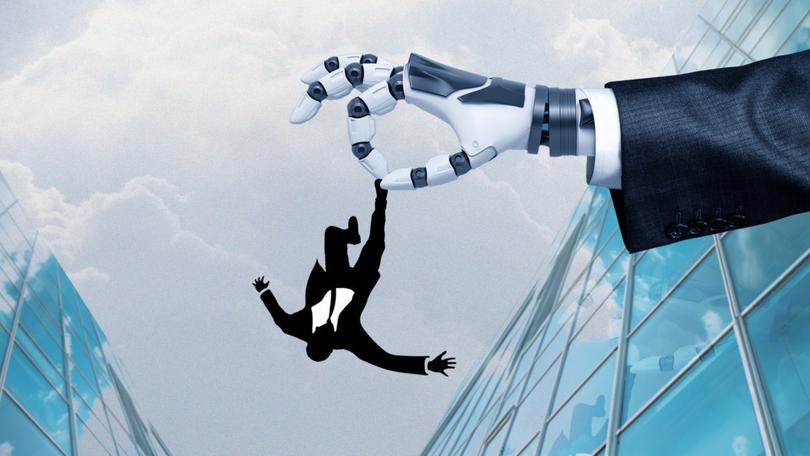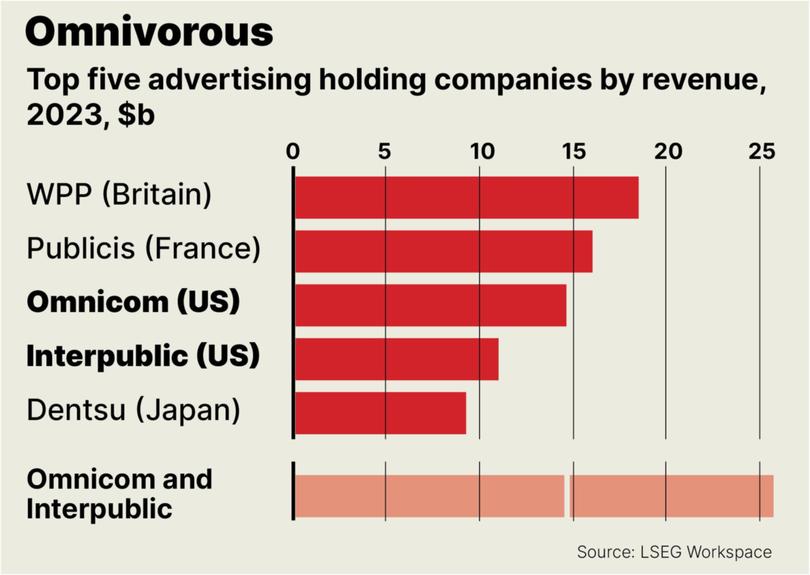THE ECONOMIST: Farewell, Don Draper: AI is coming for advertising

“Change is neither good nor bad. It simply is,” declares Donald Draper, the unflappable star of “Mad Men”, a television drama set in 1960s adland.
Not all advertising executives share his sangfroid.
Today, technology is changing the industry faster than at any time since Mr Draper’s era. The result is a reshaping of Madison Avenue that is leaving some admen choking on their Old Fashioneds.
Sign up to The Nightly's newsletters.
Get the first look at the digital newspaper, curated daily stories and breaking headlines delivered to your inbox.
By continuing you agree to our Terms and Privacy Policy.The biggest example of the disruption so far is a deal announced on December 9, in which Omnicom and Interpublic, the world’s third- and fourth-largest ad-agency holding companies by revenue, propose to combine to become by far the biggest.
The deal, structured as a takeover of Interpublic by Omnicom, would bring together a client list including Apple, Disney, Johnson & Johnson and Mattel. In leapfrogging France’s Publicis and Britain’s WPP, the enlarged Omnicom would shift advertising’s centre of gravity closer to New York.
On the face of it the industry’s troubles are hard to grasp. True, the incoming Trump administration is worrying marketers with hints that it may curb pharmaceutical advertising (which contributes 6-8 per cent of American ad revenue) or start a trade war that could hurt big-spending industries like cars and electronics.
But advertising has never been bigger. Helped by a summer Olympics and an American election, worldwide spending is on course to rise by 9.5 per cent in 2024, crossing $US1 trillion ($1.5trn) for the first time, reckons GroupM, part of WPP.
The trouble is that ever more of the business is slipping out of the well-manicured hands of the agency executives who used to control it. Tech companies, led by Google, Meta and Amazon, have made it easier for companies to create and buy their own ads.
Those three firms, plus China’s ByteDance and Alibaba, will rake in more than half of all ad spending this year, GroupM predicts. Strip out the up-and-down period of the COVID-19 pandemic and the global ad-agency industry has grown by barely 3 per cent a year since 2018, according to MoffettNathanson, a firm of analysts.
Artificial intelligence (AI) threatens to erode their role further. Generative AI can write copy and draw images; on December 9 OpenAI, maker of ChatGPT, released Sora, its video generator. AI is also making it easier to target consumers with the right ad.
The technology could eliminate 7.5 per cent of America’s advertising jobs by 2030, predicts Forrester, a research firm. Moreover, AI tools are making it easier for clients to take advertising in-house, or give the work to smaller agencies.
The biggest five agency holding companies had a 30 per cent share of all agency-services revenue last year, down from 37 per cent a decade earlier, estimates Madison and Wall, an ad consultancy.
Omnicom and Interpublic hope that together they will be protected against these trends. The companies’ bosses promise savings of $US750m ($1.2b) per year by merging shared functions, and say they will invest more in AI technology. Removing one competitor from advertising’s top tier will improve their pricing power. Regulators may not like that.
But, as Omnicom’s boss, John Wren, pointed out, the clout of Google and co ought to reassure trustbusters that there will be no shortage of competition; Mr Wren also expects a more business-friendly environment under Donald Trump. The tie-up has “tremendous industrial logic”, says Brian Wieser of Madison and Wall.

Will it enable the agencies to compete with their tech rivals? That may be the wrong question. “If I’m looking for state-of-the-art AI, am I going to go to my ad agency? Are you crazy?” asks Rishad Tobaccowala, a former chief strategist at Publicis. AI will be a service that agencies plug into, like electricity, rather than a competitive differentiator, he argues.
Perhaps more likely is that agencies push further into new kinds of work. The “holy grail” in the industry is combining ad-buying with data analysis, argues Bernstein, a broker, which cites the successful acquisition by Publicis of Epsilon, a data company, in 2019.
Publicis now has 25,000 engineers helping clients with everything from managing data to building apps. With this kind of work, agencies are competing more closely with consulting firms, which in turn are venturing into the ad-content business, with offshoots such as Accenture Song.
The bit of the advertising industry that seems most vulnerable is the creative part. “The ability to charge for producing ads is going to decline significantly because of AI,” says Mr Tobaccowala.
The newly enlarged Omnicom will control an alphabet soup of creative agencies, including Omnicom’s BBDO, DDB and TBWA, plus Interpublic’s McCann and FCB. This may be more than a single company needs, suspects Mr Wieser. If the changes coming to adland are going to be bad for anyone, it may be creative executives like Don Draper.
